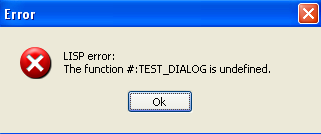A package riddle, part III (22 Aug 2009)
(defun test() (test_dialog)) (in-package :clausbrod.de) (use-package :oli) (sd-defdialog 'test_dialog :ok-action '(display "test_dialog"))Load the above code, run
(test), and you'll get:

In CoCreate Modeling, the
sd-defdialog macro automatically exports the name of the new
dialog (in this case, test_dialog) into the default package. Hence, you'd expect that
the function (test), which is in the default package, would be able to call that dialog!
Astute readers (and CoCreate Modeling's Lisp compiler) will rightfully scold me for using
(in-package) in the midst of a file. However, the error doesn't go away if you split up
the above code example into two files, the second of which then properly
starts with (in-package). And in fact, the problem originally manifested itself in a
multiple-file scenario. But to make it even easier for readers to run the test themselves,
I just folded the two files into one.
Lisp actually provides us with a subtle hint which I ignored so far: Did you notice
that the complaint is about a symbol #:TEST_DIALOG, and not simply TEST_DIALOG?
The #: prefix adds an important piece to the puzzle. Apparently, Lisp thinks
that TEST_DIALOG is not a normal symbol,
but a so-called uninterned symbol. Uninterned symbols are symbols which don't
belong to any Lisp package - they are homeless. For details:
- Creating Symbols (from "Common Lisp the Language", 2nd edition)
- Programming in the Large: Packages and Symbols (from Peter Seibel's excellent "Practical Common Lisp")
- The Complete Idiot's Guide to Common Lisp Packages
- Potting Soil: Colons continued - uninterned symbols
TEST_DIALOG turned into an uninterned symbol. We would have expected it to
be a symbol interned in the clausbrod.de package, which is where the dialog is defined!
Those who are still with me in this series will probably know where this is heading.
Anyway - next time, we'll finally
solve the puzzle!
Revision: r1.4 - 01 Sep 2009 - 10:25 - ClausBrod